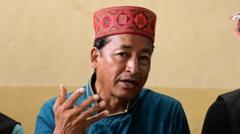Sonam Wangchuk's recent protest highlights the pressing need for autonomy and environmental protection in Ladakh, as he calls for sustainable development and representation for local communities.
Struggle for Ladakh: Activist Sonam Wangchuk Ends Hunger Strike for Ecological Justice

Struggle for Ladakh: Activist Sonam Wangchuk Ends Hunger Strike for Ecological Justice
Sonam Wangchuk, the Indian activist, vows to continue the fight for Ladakh's autonomy and ecological preservation following a 16-day hunger strike.
In the icy deserts of Ladakh, the struggle continues as Sonam Wangchuk, a prominent climate activist and innovator, ended a 16-day hunger strike this past week, emphasizing that his efforts to protect the ecology of his homeland are just beginning. At 58, Wangchuk gained national recognition in India due to his portrayal in the 2009 film "3 Idiots," inspired by his life and work. However, in recent months, his activism has focused on the urgent need for governmental autonomy for Ladakh, a unique cold desert region that borders both Pakistan and China.
Since the Indian government's 2019 decision to strip Jammu and Kashmir of its special status, Ladakh has been governed as a federal territory without any legislative powers. Locals feel marginalized and demand their own representatives to address rising concerns over development that threatens their fragile ecosystem. With assembly elections held in Jammu and Kashmir recently, discussions surrounding Ladakh's governance have intensified.
Before embarking on his hunger strike, Wangchuk and fellow activists marched hundreds of kilometers from Ladakh to Delhi, advocating for federal acknowledgement under the Sixth Schedule of the Indian Constitution. This provision could offer tribes in Ladakh the authority to safeguard their natural resources from exploitation. Their long trek to the capital stemmed from a lack of response after negotiations with government officials fell flat, reflecting local frustration amidst increased construction activities.
Upon reaching Delhi's borders, Wangchuk and other demonstrators faced detention for hours, prompting him to launch a hunger strike which he concluded when the government proposed further discussions. Throughout his activism, Wangchuk has ensured that Ladakh's struggle for autonomy remains prominent in national discourse, emphasizing the need to address the distinctive challenges faced by the region.
Sonam Wangchuk's motives extend beyond autonomy; he has long advocated for educational reforms in Ladakh, recalling his own experiences as a child and the cultural dissonance presented by a curriculum filled with foreign contexts. His advocacy has also led to innovations such as energy-efficient housing and sustainable water management solutions, which showcase his commitment to both local culture and environmental stewardship.
Despite halting his hunger strike, Wangchuk's resolve remains unwavering. He has conducted numerous protests advocating for measures to protect Ladakh’s ecological heritage, especially given that development projects often overlook local needs and challenges. “We are not against development,” stated Wangchuk, “We seek sustainable growth that respects and incorporates the fragile ecology of our region.”
As conversations continue, Wangchuk and the Ladakhi community anticipate fair negotiations that might finally grant them a say in their future. “I hope these meetings will foster trust and lead to a fruitful resolution," he shared, expressing a desire to prevent further drastic measures to be taken for his cause.
Since the Indian government's 2019 decision to strip Jammu and Kashmir of its special status, Ladakh has been governed as a federal territory without any legislative powers. Locals feel marginalized and demand their own representatives to address rising concerns over development that threatens their fragile ecosystem. With assembly elections held in Jammu and Kashmir recently, discussions surrounding Ladakh's governance have intensified.
Before embarking on his hunger strike, Wangchuk and fellow activists marched hundreds of kilometers from Ladakh to Delhi, advocating for federal acknowledgement under the Sixth Schedule of the Indian Constitution. This provision could offer tribes in Ladakh the authority to safeguard their natural resources from exploitation. Their long trek to the capital stemmed from a lack of response after negotiations with government officials fell flat, reflecting local frustration amidst increased construction activities.
Upon reaching Delhi's borders, Wangchuk and other demonstrators faced detention for hours, prompting him to launch a hunger strike which he concluded when the government proposed further discussions. Throughout his activism, Wangchuk has ensured that Ladakh's struggle for autonomy remains prominent in national discourse, emphasizing the need to address the distinctive challenges faced by the region.
Sonam Wangchuk's motives extend beyond autonomy; he has long advocated for educational reforms in Ladakh, recalling his own experiences as a child and the cultural dissonance presented by a curriculum filled with foreign contexts. His advocacy has also led to innovations such as energy-efficient housing and sustainable water management solutions, which showcase his commitment to both local culture and environmental stewardship.
Despite halting his hunger strike, Wangchuk's resolve remains unwavering. He has conducted numerous protests advocating for measures to protect Ladakh’s ecological heritage, especially given that development projects often overlook local needs and challenges. “We are not against development,” stated Wangchuk, “We seek sustainable growth that respects and incorporates the fragile ecology of our region.”
As conversations continue, Wangchuk and the Ladakhi community anticipate fair negotiations that might finally grant them a say in their future. “I hope these meetings will foster trust and lead to a fruitful resolution," he shared, expressing a desire to prevent further drastic measures to be taken for his cause.






















